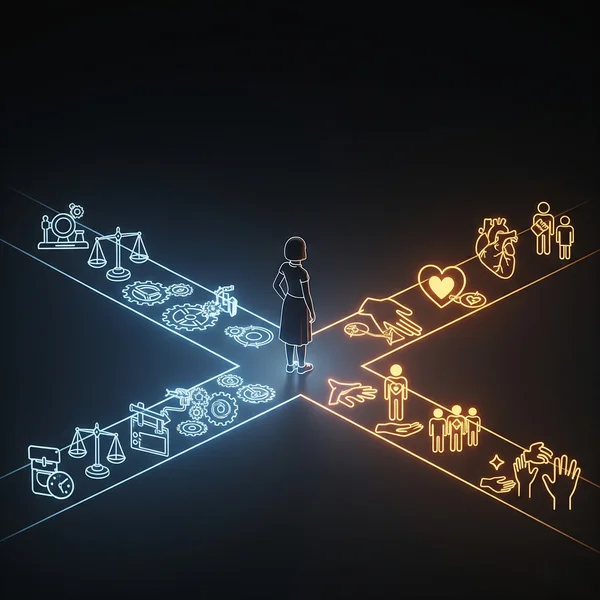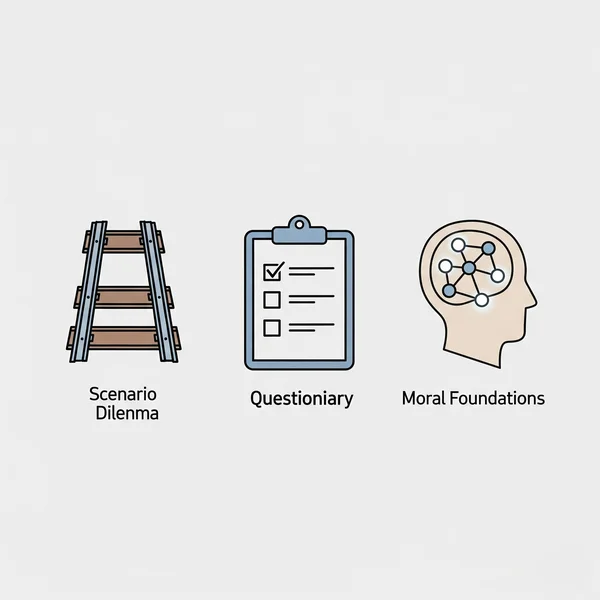ما هو الاختبار الأخلاقي؟ دليل لقيمك
July 6, 2025 | By Julian Croft
هل توقفت يومًا بعد اتخاذ قرار صغير - مثل ما إذا كنت ستشير إلى أنك تلقيت تغييرًا أكثر من اللازم - وتساءلت عما يعنيه ذلك عنك؟ نواجه هذه المعضلات الأخلاقية الدقيقة يوميًا، ولكن ماذا عن الأسئلة الأكبر؟ ما الذي يمكن أن يخبرني به اختبار التقييم الأخلاقي حقًا عن نفسي؟ إذا كنت مهتمًا بالتعمق في عملية اتخاذ القرار الخاصة بك، فإن الاختبار الأخلاقي المصمم جيدًا هو المكان المثالي للبدء. سيرشدك هذا الدليل إلى كل ما تحتاج إلى معرفته.

تعريف "الاختبار الأخلاقي": أكثر من مجرد صواب أو خطأ
أولاً، دعنا نوضح سوء فهم شائع. الاختبار الأخلاقي لا يتعلق بالحصول على درجة أو تسمية "جيد" أو "سيء". هدفه الأساسي ليس الحكم عليك، بل أن يكون بمثابة مرآة، تعكس المبادئ الكامنة التي توجه خياراتك في المواقف المعقدة.
تجاوز الأحكام البسيطة
على عكس اختبار الرياضيات الذي له إجابات محددة، فإن اختبار الأخلاق يتعامل مع مناطق رمادية. يقدم لك سيناريوهات صعبة لا توجد فيها حلول سهلة، مما يجبرك على تقييم القيم المتنافسة. تكمن الرؤية الحقيقية في سبب اختيارك لما تختاره، وليس مجرد الاختيار نفسه.
الهدف: استكشاف عملية اتخاذ القرار الخاصة بك
الهدف الأساسي لهذه الاختبارات هو تسليط الضوء على عملية اتخاذ القرار الفريدة الخاصة بك. هل تميل إلى الحلول التي تحقق أكبر قدر من الخير لأكبر عدد من الناس (نهج نفعي)؟ أم تعتقد أنه يجب عدم كسر قواعد وواجبات معينة أبدًا، بغض النظر عن النتيجة (نهج ديونتولوجي)؟ يمكن للاختبار مساعدتك في رؤية هذه الأنماط في تفكيرك الخاص.
مقدمة في الأطر الأخلاقية
تستند العديد من الاختبارات إلى أطر أخلاقية راسخة من الفلسفة وعلم النفس. من خلال المشاركة، تحصل على تجربة عملية لهذه الأفكار القوية، مما يجعل المفاهيم المجردة تبدو شخصية وذات صلة.
لماذا تجري اختبارًا أخلاقيًا؟ فوائد الاستكشاف الذاتي
إذًا، لماذا يجب عليك قضاء الوقت في اختبار أخلاقي؟ تمتد الفوائد إلى ما هو أبعد من مجرد إشباع الفضول البسيط. يمكن أن يكون الانخراط في هذا النوع من الاستكشاف الذاتي تجربة مجزية حقًا.
اكتساب الوعي الذاتي
الفائدة الأكثر فورية هي فهم أعمق لـ قيمك الشخصية. ما الذي تعطي الأولوية له حقًا عندما تتعارض المبادئ؟ الصدق؟ الرحمة؟ العدالة؟ الولاء؟ يمكن للاختبار أن يجلب بوصلتك الأخلاقية اللاواعية إلى المقدمة، مما يوفر وضوحًا حول ما يحفزك حقًا.
تحسين مهارات التفكير النقدي
يؤدي التنقل في المعضلات الأخلاقية، حتى الافتراضية منها، إلى شحذ تفكيرك النقدي. تتعلم تحليل المشكلات من زوايا متعددة، وتوقع العواقب، والتعبير عن الأساس المنطقي وراء استنتاجاتك. هذه مهارة قيمة في كل جانب من جوانب الحياة، من العلاقات الشخصية إلى القرارات المهنية.
تسهيل المحادثات المهمة
يمكن أن يكون الاختبار الأخلاقي محفزًا ممتازًا للمناقشات الهادفة. يمكن أن يؤدي مشاركة نتائجك مع الأصدقاء أو العائلة أو في بيئة صفية إلى فتح محادثات رائعة حول وجهات النظر المختلفة والقيم المشتركة، مما يعزز التعاطف والتفاهم المتبادل.
أنواع اختبارات التقييم الأخلاقي التي ستواجهها
ليست كل الاختبارات متساوية. تأتي بأشكال مختلفة، كل منها مصمم لاستجواب غرائزك الأخلاقية بطرق مختلفة. عندما تكون مستعدًا لـ إجراء اختبار تقييم أخلاقي، فمن المحتمل أن تواجه هذه الأنواع الشائعة.

معضلات قائمة على السيناريو
هذا هو الشكل الكلاسيكي. سيتم تقديم قصة أو معضلة مفصلة لك، مثل مشكلة عربة الترام الشهيرة أو موقف يتضمن الذكاء الاصطناعي في سيارة ذاتية القيادة، وسيُطلب منك اتخاذ قرار. هذه قوية لأنها تحاكي ضغط وتعقيد التحديات الأخلاقية في العالم الحقيقي.
استبيانات القيم
تقدم لك هذه الاختبارات سلسلة من العبارات (على سبيل المثال، "من الأهم أن تكون عادلًا من أن تكون رحيمًا.") وتطلب منك تقييم مدى موافقتك أو عدم موافقتك. هذه فعالة في إنشاء ملف تعريفي واسع لـ قيمك الشخصية ومبادئك الأساسية.
اختبارات الأسس الأخلاقية
مستوحاة من نظرية الأسس الأخلاقية، تقيم هذه الاختبارات مدى اعتمادك على "أسس" أخلاقية مختلفة، مثل الرعاية/الضرر، والإنصاف/الغش، والولاء/الخيانة. يساعد هذا في تفسير سبب امتلاك الناس لقناعات أخلاقية مختلفة اختلافًا عميقًا، ولكنها عميقة بنفس القدر.
كيف يعمل تقييم Moraltest.org: نظرة خلف الكواليس
نحن نؤمن بالشفافية. فهم كيفية عمل منصتنا هو مفتاح الثقة في الرؤى التي تتلقاها. إن تقييم Moraltest.org هو أكثر من مجرد اختبار؛ إنها تجربة مصممة بعناية.

منهجيتنا: تستند إلى المبادئ الفلسفية
سيناريوهاتنا ليست عشوائية. تم تصميمها للمس النقاشات الرئيسية في الأخلاق وهي مستنيرة بـ الأطر الأخلاقية الراسخة. نستمد من قرون من الفكر الفلسفي لإنشاء معضلات خالدة وذات صلة بالحياة الحديثة على حد سواء.
تحليل خياراتك للحصول على رؤى شخصية
بعد إكمال الاختبار، يقوم نظامنا بتحليل نمط خياراتك. لا يقتصر الأمر على حساب إجاباتك؛ بل يحدد القيم الكامنة التي تعكسها قراراتك. النتيجة هي تقرير شخصي يقدم رؤى حول ملفك الأخلاقي الفريد، مما يساعدك على ربط النقاط في تفكيرك الخاص.
خصوصيتك وإخفاء هويتك للبيانات
نحن نأخذ خصوصيتك على محمل الجد. جميع نتائج الاختبار مجهولة الهوية. هدفنا هو توفير مساحة آمنة لـ الاستكشاف الذاتي، وهذا يبدأ بضمان شعورك بالأمان أثناء استخدام أداتنا.
هل أنت مستعد لاكتشاف بوصلتك الأخلاقية؟
لقد استكشفنا ما هو الاختبار الأخلاقي، ولماذا هو أداة قيمة للنمو الشخصي، والأشكال المختلفة التي يمكن أن يتخذها. الأمر لا يتعلق بالنجاح أو الفشل؛ بل يتعلق برحلة اكتشاف. من خلال الانخراط في هذه التحديات المثيرة للتفكير، تحصل على صورة أوضح لعالمك الداخلي والقيم التي تحددك.
الآن، السؤال الوحيد المتبقي هو: ماذا ستكتشف عن نفسك؟
أسئلة متكررة حول الاختبارات الأخلاقية
هل هناك إجابة "صحيحة" واحدة في الاختبار الأخلاقي؟
بالتأكيد لا. الغرض من الاختبار الأخلاقي هو استكشاف عملية اتخاذ القرار والقيم الشخصية الخاصة بك، وليس تقييمك. تأتي النتائج الأكثر إفادة من الإجابة بصدق، بناءً على قناعاتك الخاصة.
كيف يختلف الاختبار الأخلاقي عن اختبار الشخصية؟
بينما يعزز كلاهما الوعي الذاتي، فإنهما يركزان على جوانب مختلفة. يصف اختبار الشخصية (مثل مايرز بريجز أو العوامل الخمسة الكبرى) سماتك وميولك العامة (مثل الانطواء/الانبساط). من ناحية أخرى، الاختبار الأخلاقي يفحص على وجه التحديد كيف تقوم بالاستدلال من خلال الصراعات الأخلاقية وما هي القيم التي تعطيها الأولوية عند اتخاذ خيارات صعبة.
كم يستغرق الاختبار الأخلاقي؟
تم تصميم اختباراتنا لتكون ممتعة، وليست مرهقة. يكمل معظم المستخدمين التقييم الأساسي في حوالي 10-15 دقيقة. نشجعك على أخذ وقتك، والتفكير في السيناريوهات، واختيار الخيار الذي يمثل قناعاتك الحقيقية. هل أنت مستعد لبدء رحلتك؟ يمكنك بدء الاختبار هنا.